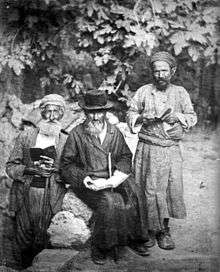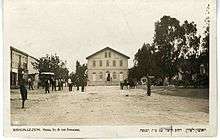Moshava
| Old Yishuv |
|---|
 |
| Key events |
| Key figures |
|
| Economy |
| Philanthropy |
| Communities |
| Synagogues |
| Related articles |
A moshava (Hebrew: מושבה), plural: moshavot (מושבות), is a form of rural Jewish settlement in Ottoman Syria, established by the members of the Old Yishuv since late 1870s and during the first two waves of Jewish Zionist immigration - the First and Second Aliyah.
In a moshava, as opposed to later communal settlements like the kibbutz and the moshav, all the land and property are privately owned. The first moshavot, described as "colonies" in professional literature, were established by the members of the Jewish community and by pioneers of the First Aliyah arriving to Ottoman Palestine.[1] The economy of the early moshavot was based on agriculture.
Petah Tikva, known as the "Mother of the Moshavot" (Em HaMoshavot),[2] was founded in 1878 by members of the Old Yishuv, as well as Gai Oni, which later became Rosh Pina with the arrival of the First Aliyah. The first four moshavot of the First Aliyah period were Rishon LeZion, Rosh Pinna, Zikhron Ya'akov and Yesud HaMa'ala.[1]
The 28 moshavot established by Old Yishuv and the First Aliyah

.jpg)
- Rishon LeZion (1882)
- Rosh Pinna (1882, taking over and renaming the colony of Gei Oni established in 1878 and down to three families by 1882)
- Zikhron Ya'akov (1882)
- Petah Tikva (1882; reestablished after first attempt in 1878)
- Mazkeret Batya (1883 established as "Ekron")
- Ness Ziona (1883; began as "Nahalat Reuven")
- Yesud HaMa'ala (1883)
- Gedera (1884)
- Bat Shlomo (1889)
- Meir Shfeya (1889)
- Rehovot (1890)
- Mishmar HaYarden (1890)
- Hadera (1891)
- Ein Zeitim (1892)
- Motza (1894)
- Hartuv (1895)
- Metula (1896)
- Be'er Tuvia (1896 reestablished and renamed by Hovevei Zion; first settled in 1887 under the name Castina)
- Bnei Yehuda (1898; not identical with the new Bnei Yehuda)
- Mahanayim (1898-1912)
- Sejera (1899)
- Mas'ha (1901), renamed Kfar Tavor in 1903
- Yavne'el (1901)
- Menahemia (1901)
- Beit Gan (1903; next to Yavne'el)
- Atlit (1903)
- Giv'at Ada (1903)
- Kfar Saba (1904)
Not included here are the five ephemeral colonies of the First Aliyah in the Hauran.
Moshavot established during the Second Aliyah
See also
References
- 1 2 Bennett, John W. (1971). "Moshava, Kibbutz, and Moshav: Patterns of Jewish Rural Settlement and Development in Palestine by D. Weintraub, M. Lissak, Y. Azmon". American Journal of Agricultural Economics. Agricultural & Applied Economics Association. 53 (2): 380–2. ISSN 1467-8276. JSTOR 1237479 – via JSTOR. (registration required (help)).
- ↑ Moshava Zionism and Israel - Encyclopedic Dictionary